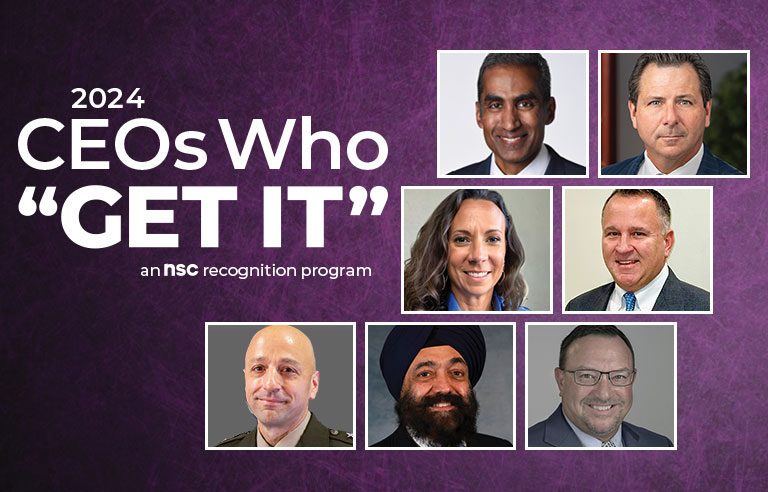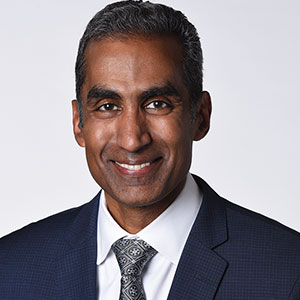2024 CEOs Who "Get It"


Bob Pragada
CEO
Jacobs
Dallas, TX
With approximately $16 billion in annual revenue and a talent force of more than 60,000, Jacobs provides a full spectrum of professional services, including consulting, technical, scientific, and project delivery for the government and private sector. Jacobs helps make the world smarter, more connected and more sustainable, supporting better outcomes for critical infrastructure, advanced manufacturing, cities and places, energy and environment, health and life sciences, national security, and space.

Describe your personal journey to becoming a CEO who “gets it.”
Safety leadership has defined my 33-year career, from my service as a Naval officer beginning in 1990 to my current role as Jacobs’ CEO. During my time in the Navy, I led teams responding to devastating crises where I was able to hone values such as caring for others, building resilience and leading from the trenches – things that shaped my leadership approach and style forever. My commitment to safety was further solidified as the facilities director for Camp David, where my remit was to safeguard the security of the president and his family.
These personal values would go on to shape my leadership as a civilian. Since joining Jacobs in 2006, I’ve consistently fostered a people-first culture of engagement – “walking the talk” on safety – and played a central role in developing our industry-leading BeyondZero Culture of Caring. At the core, my approach is a steadfast emphasis on the essential role that leaders at all levels play in fostering a culture of genuine engagement.
Improving safety and well-being requires collective commitment, resources and expertise – what I like to call “the power of we.” In setting an example, we always open our global town hall meetings with a Culture of Caring safety message as a reminder that the success of our company depends on our individual personal involvement with safety. My passion for partnering with organizations such as the National Safety Council, clients, supply-chain vendors and competitors alike is a testament to our mission of making our world a safer, healthier place and ensuring the focus on safety and well-being remains at the backbone of our company strategy.
Why is safety a core value at Jacobs?
It’s been a foundational core value going back to Joe Jacobs, the founder of our company, and his philosophy that “if you can’t lead safety, you can’t lead.” Even though we had an existing strong foundation and reputation, we wanted to be great. So, in 2007, we launched our BeyondZero Culture of Caring initiative, which is our approach to the health, safety and security of our people; the protection of the environment; and the resilience of our organization – reaching beyond the boundaries of the workplace and into our homes and the communities we serve. Continually nurtured and reinforced over the past 16 years, that mindset is now engrained in our DNA and remains a guiding principle in our overall company strategy and how we respond during major events and crises.
What’s the biggest obstacle to safety at Jacobs?
Jacobs’ greatest challenge in recent years has been to proactively mitigate the impact of external factors on mental health and the well-being of our employees while concurrently fostering an environment that optimizes human performance. The undeniable impact of the COVID-19 pandemic, rising violence and hate crimes, natural disasters, political unrest, global armed conflicts, and other significant stressors has been exacerbated by limited in-person opportunities with our colleagues because of the widespread adoption of work-from-home and/or hybrid working arrangements.
Addressing these challenges has been one of our primary focal points over the past five-plus years, with initiatives such as our Mental Health Matters program, One Million Lives tool and activities, Jacobs Employee Networks, and our Action Plan for Advancing Justice and Equality – which includes funding for other organizations that align with our vision for advancing underserved communities. We aim to have a positive impact on our people no matter what is happening in the world, in our communities or at home. Jacobs strives to provide an environment and support for the overall well-being of our employees.
How do you instill a sense of safety on an ongoing basis?
Our BeyondZero Culture of Caring begins during our hiring and on-boarding process. We deliberately seek people who share our passion for caring for others, especially those in leadership positions. Once a candidate selection is made, even before their first day, we begin integrating them into our overall culture training program. Once on board, we have multiple touch points and opportunities to solidify and validate our Culture of Caring, including our Navigators program, where new hires are assigned someone to help them learn our systems and tools.
Across the company we also have more than 2,000 positive mental health champions. These trained volunteers are integrated globally and work to provide a shoulder and guidepost for others and the many support services Jacobs offers. There are also a range of everyday activities. For example, at Jacobs, we seek to have every meeting start with a Culture of Caring moment – a short communication activity that creates a safe space to discuss topics such as safety, security, well-being, inclusion, quality or innovation. We use this approach so any person can play an instrumental role in instilling a sense of our culture across their teams and among colleagues.
How does Jacobs measure safety?
Our primary measure is the traditional total recordable incident rate and days away rate to gauge trends in incidents. Our more proactive leading indicators are our BeyondZero Observations (BZO) – our term for a safety observation report in which we review the correlation between incident rates and BZOs, and our leadership engagements. When BZOs and/or leadership engagement activities go down, we see this as a predictor of more incidents in those locations and can assess if an increase in leadership engagement is needed. Jacobs also has a range of risk-based governance activities that aim to identify and monitor operational activities with an elevated risk profile through an established audit program.
To continually improve our health and safety risk management approaches, we are increasing our focus on activities that have a potential for elevated risk that could potentially cause the greatest harm. As we transform our company and our operational risk profile changes, we seek to continue to integrate safety in design and human performance considerations with activities risk to health, security safety, environment and security.
What roles do off-the-job safety, mental health and well-being play in Jacobs’ overall safety program?
It’s a critical piece. We have launched a holistic global well-being strategy centered on physical, emotional, financial and social health, understanding that our people must feel supported in all four pillars to best be able to produce the most creative and innovative solutions for our clients.
We’ve greatly expanded our employee assistance services to include 24/7 access to professional support, which is multimodal to “meet people where they are” and how they prefer to communicate.
Our positive mental health champions are also available outside of the offices, able to intervene and engage with people in their homes to help them feel better mentally and more prepared to work safer.
Post a comment to this article
Safety+Health welcomes comments that promote respectful dialogue. Please stay on topic. Comments that contain personal attacks, profanity or abusive language – or those aggressively promoting products or services – will be removed. We reserve the right to determine which comments violate our comment policy. (Anonymous comments are welcome; merely skip the “name” field in the comment box. An email address is required but will not be included with your comment.)


